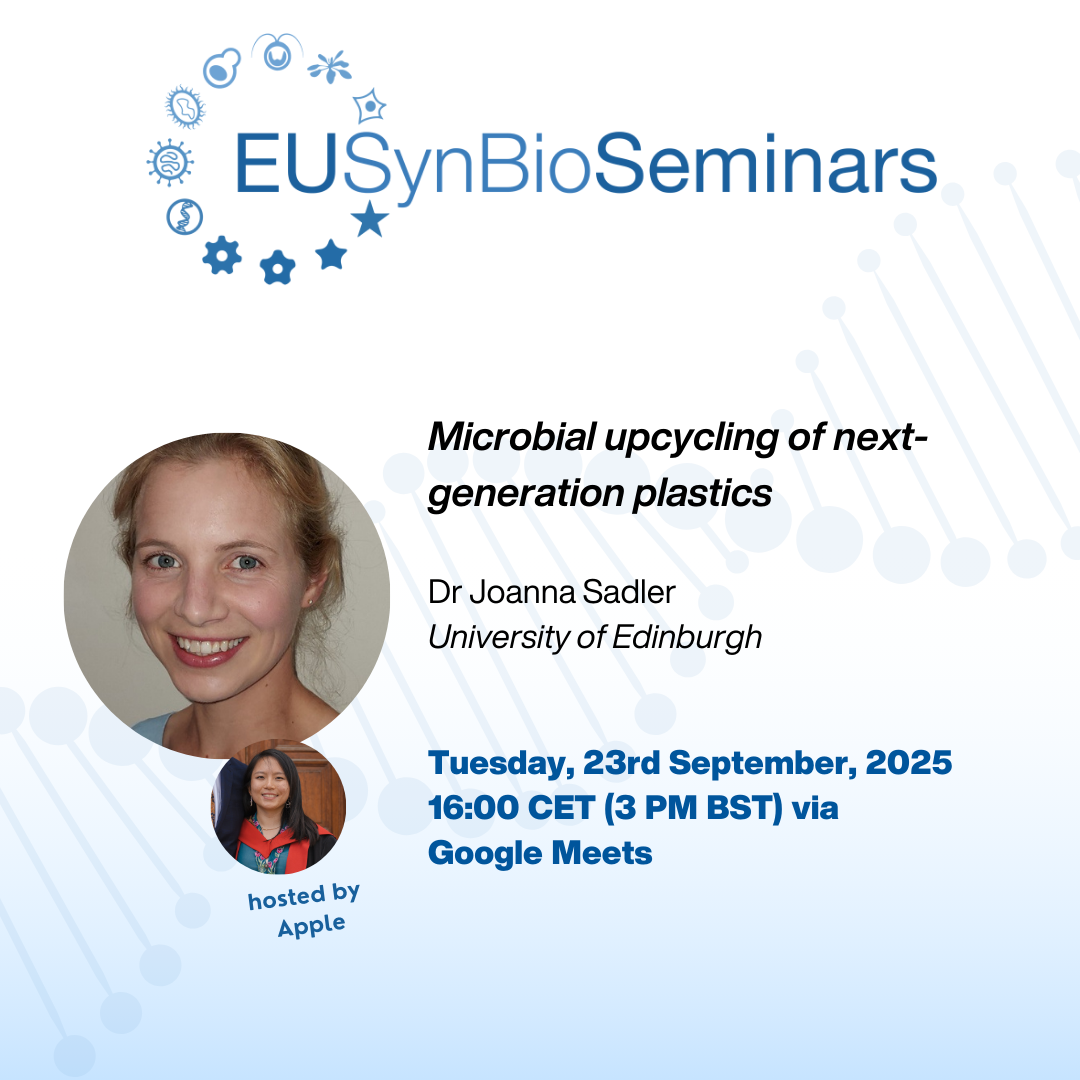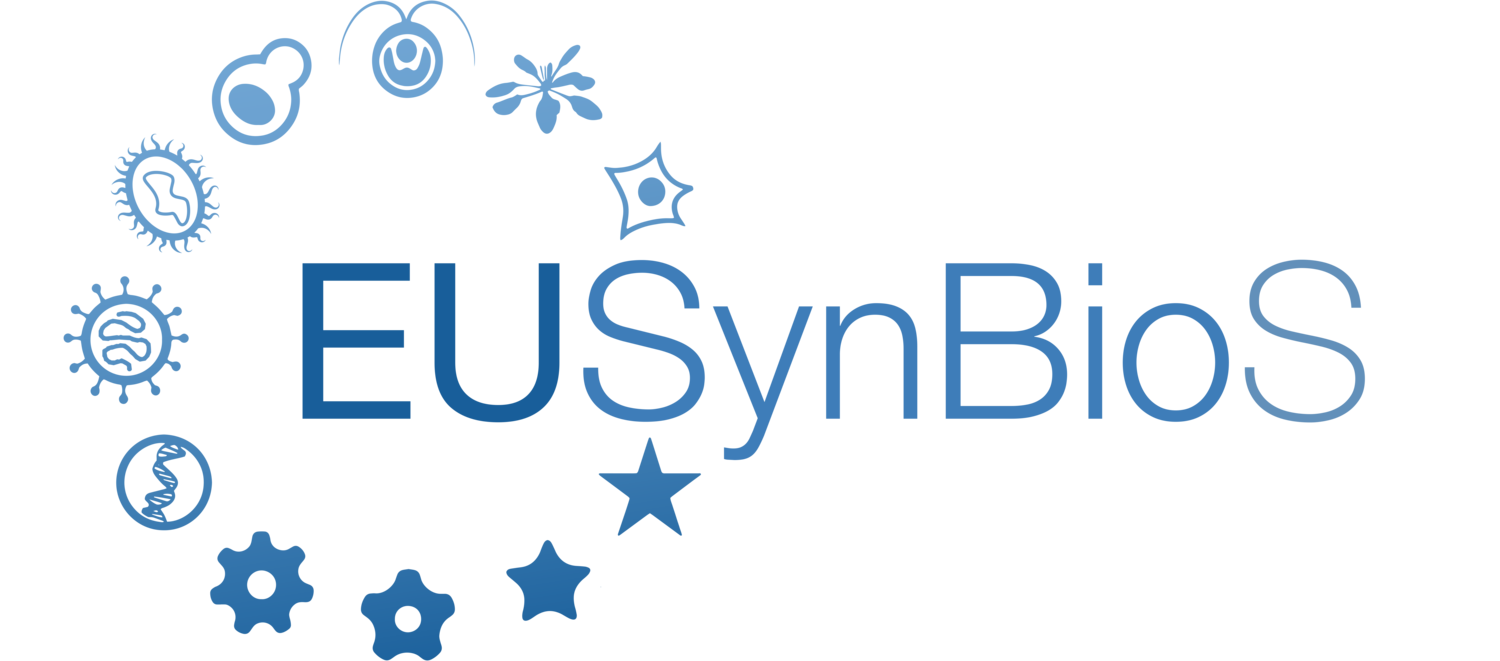EUSynBioSeminars
Since May 2020, we have been hosting this online seminar series, where we invite researchers from the synthetic biology community to give short presentations about their most recent work. The aim is to offer a platform for a wide range of topics related to synthetic biology, accessible to everyone for free.
Don’t miss any future seminar!
Want to share your work?
Missed a seminar?
Upcoming Seminars

Microbial upcycling of next-generation plastics
The plastic waste crisis is catalysing change across the sector and with it, we should anticipate high volumes of bio-based and 'biodegradable' waste streams in the future. However, plastic upcycling technologies to date largely focus on degradation and upcycling of petrochemical-derived plastics.
In this talk, Joanna will turn our attention to the 'next-generation' of plastic waste, and will demonstrate two examples of converting bio-based polymers poly(lactic acid) and poly(hydroxybutyrate) into useful industrial chemicals such as acetone, protocatechuate and vanillin, via engineered microbial metabolism. This work demonstrates a fully circular and sustainable lifecycle for this emerging class of materials and shows that we should be thinking 'beyond biodegradable' to fully exploit the circular potential of next-generation plastics.
We’re excited to host Dr @Joanna Sadler from the @University of Edinburgh School of Biological Sciences
Read the publication: https://pubs.acs.org/doi/10.1021/acssuschemeng.4c00357

Microbial Oxidation of atmospheric trace gases: from discovery to application
Microbial oxidation of atmospheric trace gases: from discovery to application


From resonance to chaos: modulating spatiotemporal patterns through a synthetic optogenetic oscillator
Thursday, 12 December 2024
Join the next #EUSynbioSeminar and hear Jung Hun Park from the University of Lausanne give a talk titled "From resonance to chaos: modulating spatiotemporal patterns through a synthetic optogenetic oscillator."
Register here to join us the 12th of December at 16:00 CET

Selective RNA pseudouridinylation using circular gRNA in designer organelles
Thursday, 21 November 2024
Join the next #EUSynbioSeminar and hear Lukas Schartel from the International Max Planck Research School (IMPRS) of Cellular Biophysics give a talk titled "Selective RNA pseudouridinylation using circular gRNA in designer organelles."
RNA modifications play a pivotal role in the regulation of RNA chemistry within cells. Several technologies have been developed with the goal of using RNA modifications to regulate cellular biochemistry selectively, but achieving selective and precise modifications remains a challenge. Using designer organelles, we can modify mRNA with pseudouridine in a highly selective and guide-RNA-dependent manner. These designer organelles are based on the principle of phase separation, a central tenet in developing artificial membraneless organelles in living mammalian cells. In addition, we used circular guide RNAs to markedly enhance the effectiveness of targeted pseudouridinylation. Our studies offer spatial engineering by means of optimized RNA editing organelles (OREO) as a complementary tool in using targeted RNA modification to expand potential avenues for future investigation.
Register here to join us the 21st of November at 16:00 CET

Programmable Molecular Factories: Synthetic Biology for Resource Production
Tuesday, 25 June 2024
Join the next #EUSynbioSeminar and hear Mathieu Nohet, co-founder of baCta give a talk titled "Programmable Molecular Factories: Synthetic Biology for Resource Production"
Register here to join us the 25th of June at 16:00 CET

Engineering Promoters and 5' UTRs: A Journey from Random DNA to Rational and Predictable Design with Transformer Models
Thursday, 30 May 2024
Join the next #EUSynBioSeminar and hear Dr. Rahmi Lale from the Norwegian University of Science and Technology (NTNU) and co-founder and CEO of Syngens give a talk titled "Engineering Promoters and 5' UTRs: A Journey from Random DNA to Rational and Predictable Design with Transformer Models"
Register here to join us the 30th of May at 16:00 CET

“Distributed computing with engineered bacteria performing complex computing functions“
Thursday, 27 April 2023
Join the next #EUSynbioSeminar and hear Dr. Kathakali Sarkar from the Imperial College London give a talk titled "Distributed computing with engineered bacteria performing complex computing functions"
Register here to join us the 28th of November at 16:00 CET

“Synthetic Regulatory Genomics: genome writing to understand gene expression control”
Tuesday, 11 July 2023
Join the next #EUSynbioSeminar and hear Dr. Sud Pinglay, Postdoctoral fellow from NYU, give a talk titled “Synthetic Regulatory Genomics: genome writing to understand gene expression control“
Register here to join us the 11th of July at 13:00 CET

“Combinatorial approach for prenylflavonoids de novo production in Escherichia coli“
Join the next #EUSynbioSeminar on 29th of June at 16:00 CET and hear Daniela Gomes from the University of Minho giving a talk entitled "Combinatorial approach for prenylflavonoids de novo production in Escherichia coli"
Register by scanning the QR code or clicking here

AI + Biology for sustainable ingredients
Join the next #EUSynbioSeminar on the 18th of May at 16:00 CET and hear Simão Soares CEO and co-founder of SilicoLife give a talk titled "AI + Biology for sustainable ingredients"
Register by scanning the QR code or clicking here

"Exploring tRNAs and their modifications and crosstalk using Nano-tRNAseq, a nanopore RNA sequencing method"
Thursday, 27 April 2023
Join the next #EUSynbioSeminar and hear Morghan Lucas from the Centre for Genomic Regulation (CRG) give a talk titled "Exploring tRNAs and their modifications and crosstalk using Nano-tRNAseq, a nanopore RNA sequencing method"
Register here to join us the 27th of April at 16:00 CET

EUSynBioSeminar: "Multihost, multiplasmid genetic logic library: What happens in E.coli, stays in E.coli"
Join the next #EUSynbioSeminar on the 30th of March at 16:00 CET and hear Dr. Lewis Grozinger from the Polytechnic University of Madrid (UPM) give a talk titled "Multihost, multiplasmid genetic logic library: What happens in E.coli, stays in E.coli"
Register here to join us the 30th of March at 16:00 CET

EUSynbioSeminar: "In silico metabolic engineering for increased production of +100 chemicals in yeast cells, what have we learned?"
Join us for our next EUSynbioSeminar and hear Iván Domenzain, from Jens Nielsen’s lab, speak about “In silico metabolic engineering for increased production of +100 chemicals in yeast cells, what have we learned?”
Register here to join us the 23rd of February at 16:00 CET

EUSynBioSeminar: “Biosaftey in Synthetic Biology: A Genetic Firewall Metric”
EUSynBioS seminars are back! Our first speaker of 2023 is CEO/Founder of BioFacation, Dr. Markus Schmidt.
Dr. Markus Schmidt has an interdisciplinary background in biomedical engineering, biology and technology assessment. He initiates and executes a number of projects dealing with responsible research and innovation in emerging science and technology areas, bringing together various stakeholders from science, regulation, industry, civil society and art. Markus’s talk is entitled ‘Biosaftey in synthetic biology: a genetic firewall metric’.
Register here and join us on January 19th at 16:00 CET


🦠 Can Microbes live on air? Have you ever hear of aerotrophy? Watch the video to find more about microbial oxidation and its possible cool applications.
In our monthly Seminars we have with us Prof. Chris Greening from the University of Monash, Australia.
🦠 Can Microbes live on air? Have you ever hear of aerotrophy? Watch the video to find more about microbial oxidation and its possible cool applications.
Abstract:
The atmosphere provides most of the oxygen, carbon, and nitrogen essential for life, yet has long been considered too energy-poor to sustain microbial activity. Research by our team has demonstrated that diverse microbes can survive by harvesting trace amounts of hydrogen and carbon monoxide from air using high-affinity enzymes. Focusing on Mycobacterium smegmatis as a model organism, we have elucidated the physiological role, genetic regulation, and structural basis of this metabolic strategy. Our findings show that many microbes and ecosystems are variably partially or primarily powered by atmospheric energy sources. Building on this work, we are developing applications to support a circular bioeconomy, including whole-cell biocatalysis and the in vitro generation of electricity and ATP from air. These discoveries redefine the minimal requirements for life with broad scientific and technological implications.